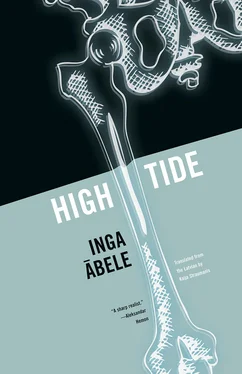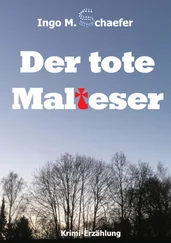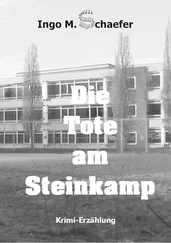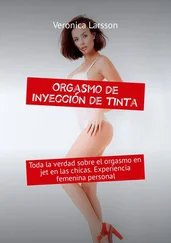“Think it through! It’ll look bad on you.”
“Who tells a punk what he can or can’t do?”
Aksels winds up in a bad mood and comes home the following night blackout drunk. His hair is a stiff, black crest. He slurs that Dace did it for him.
“Where did she do it?”
“At the carpentry shop!”
At the carpentry shop! Ieva hasn’t been there in the longest time. Maybe Dace lives there now! That’s why Aksels only ever comes home toward morning.
Insane jealousy, spite, and exhaustion crash simultaneously down on Ieva like sudden blindness. She can’t see anything anymore, nothing real, no future, and no light at the end of the tunnel.
Aksels explains:
“Stop freaking out! It doesn’t matter because I only love you, you’re my Nancy. Everything else is just something secondary.”
Before he falls asleep he reaches for Ieva, forcefully grabs her thigh, latches onto her like a bear clawing into her side, tearing at her, then he mumbles something and passes out. Ieva watches his exposed face, unveiled by sleep, deformed by drinking. Then she watches the flies circling the light bulb above the bed.
Outside the rain is coming down hard.
When Ieva was little, Gran was always fighting the flies — she’d put screens in the windows, go after them with a fly swatter, and poison them with chemicals from a black and white mister. Here the window facing the street is always open, you can watch flies in their natural state. They congregate in the room, dance, listen to “Love Kills” by the Sex Pistols, and then disappear as quietly as they came.
Ieva checks on Monta in her bed, straightens the blanket, goes to the kitchen. Right now it’s mostly empty. A strange guy is sitting in his underwear on a stool by the wall — he has his arms wrapped around his body and his legs crossed. The curve of his ribs sticks out on his back like sharp swords under his thin skin. Probably some student. Ieva searches the shelves for a bottle of red wine — and she finds one, thank God! The white wine is always the first to go.
“Ahoy! How’s it going?” Ieva asks the guy.
“Can’t complain,” he answers.
Ieva nods to him, pours him a generous glass of wine. There’s no further conversation. Ieva drains the remainder of the bottle in one go.
She goes back to her room, turns on the small wall lamp and looks at the remains of Aksels. With anguish in her face, she gets a pair of scissors and cuts off his mohawk. The black, foreign pieces litter the pillow. After that she opens the scissors wide and resolutely drags them across the veins of her left hand.
Odd, there’s almost zero pain. Only that horrible anxiety where you feel like a bowl with a crack in the side and the contents dripping out. The awareness that hangs in the chamber of your skull like a bat flapping its wings wildly — soon enough it will be washed away, too. Solder it shut, sew it up, fix the hole! — her brain screams. Ieva looks at her arm — it’s such a thin arm. With such important blood. She would’ve never thought that blood itself was the content. And when it drops to the ground, you can’t gather it back up again.
Then that warning, hot throbbing starts up in her ears, throat, temples — who knows where it comes from. The last thing she remembers is the half-naked guy in the kitchen and his terrified expression when she wakes him up to hand him her cellphone, pointing to the phone number on the wall above the sink and repeating: Mom! Mom!
Her left arm was so tightly bandaged that it felt like it was made of wood. They gave her a small pill and, when she woke later that night, she felt she had grown distant from herself. On the second morning they gave her two even smaller pills, and she crashed down onto the bed like she’d been knocked out. But her conscience wandered the ceilings, sadly observing its reflection down there on the mattress. Time dragged on like a giant rubber band, people came, undressed her and put her on a gurney, covered her with a blanket. Gave her a shot of something. Riding through countless, light bulb-lit tunnels, she felt she was exhausted to the point of death. They wheeled her off to the side; listening to the surrounding activity, the rustle of the greenish-grey cloth, she wants eternally peaceful sleep. But it’s not possible because her essence was removed from her and broken apart. Then they brought her under lights, there were several people who cut into her bare arms — all she could see were their eyes. These eyes were calm, but she was so tired. It took them a long time to find her vein and they told her it was alright to scream because it would definitely hurt, but she was so tired that she wasn’t able to tell pain from non-pain. It didn’t worry her anymore. Her only and slightly hazy desire was to reconnect with herself, to become whole again. Instead, someone gripped her face between strong hands and looked into her eyes, saying: Your heart is going to start beating faster now and you’ll get dizzy, and then you’ll fall asleep — can you hear me, Ieva, Ieva, Ieva?
One face slowly solidifies in the fog. It’s her brother, Pāvils.
He’s shaking her by the shoulder.
“Pāvils? How’d you get here?”
“I’m visiting on vacation. And you’ve scared the crap out of me my first night back.”
“Sorry, I didn’t mean to.”
“I’m happy you’re alive. They had to redo the surgery — they hadn’t stitched the tendons up the right way. You — when you do something, you do it with such drive that not even a team of doctors can deal with it!”
“You’ll stay in Latvia?”
“We’ll see. We’ll have time to talk about it. Rest for now.”
“I’m glad you’re here.”
Monta didn’t see any part of what happened. When Ieva gets back home, she’s loving and gentle as she hugs her mother’s neck. Aksels has changed, too. He’s grown more serious, darker. It doesn’t suit him.
“Hey,” Ieva says. “Cheer up! It had nothing to do with you. I just got lost in something.”
Aksels doesn’t smile, but hugs her tightly and shudders as if he’s fighting to hold back tears.
“Aksels, love, please, be like you were before,” Ieva begs, terrified. “I won’t do it again.”
Aksels is never the same after that. Some time later Ieva learns from his friends that Dace died. Overdosed on some kind of unknown pills. Had a heart attack.
Ieva’s own heart feels a small twinge. What was she to you, Aksels? And what am I? I’ll never know. The heavens are silent.
Aksels has become more of a homebody. Plays with Monta, reads to her, even takes her to kindergarten. He doesn’t cut his hair into a mohawk anymore, lets it grow out thick and light and short. It’s an almost unbelievable transformation, but Ieva hopes it’s for the best. If only she didn’t have to see the look in his eyes — even more hopeless than before, almost indifferent, and simultaneously shy. As if he’s waiting for fate to take away his final plaything.
Ievaand Aksels head to the bus stop for Riga early one morning. An icy wind tears over the countryside. Aksels picks up Monta and buries her face in the warm crook of his neck. He never has mittens, Jesus! The cold is merciless, the first warning to all living beings that winter is on its way. Ieva looks back and sees his frozen, bare, and bluish hands locked around Monta. And she is grateful.
They wait at the crossroads where four roads come together. The sky is black, the land around them is covered with a light dusting of snow. Their fatherland. From the leeside of the hill they can hear the roaring of fir trees in the gully by the stables. Ieva wants to hold onto this sound forever and can’t believe she’s leaving.
Читать дальше












